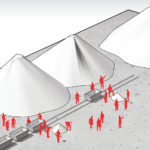
The Radical Anti-imperialist Consciousness of Bolivian Tin Miners in the Early 20th-Century
With the ascendance of Evo Morales to the presidency of Bolivia, the government disinterred “anti-imperialist” sentiments to challenge the overbearing influence of the United States on Bolivian politics. This renewed anti-imperialist discourse draws from layers of localized history accreted during Bolivia’s long status as a peripheral country entangled in the workings of the world system. My intention here is not to focus on the re-emergence of this politics today, but to re-assess the origins and conditions of anti-imperialist consciousness among workers the 20th-century Bolivian Andes.
 Viewpoint Magazine
Viewpoint Magazine